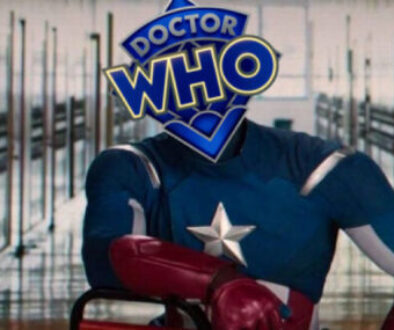The Doctor: Dark Hero No More?
Guest contributor Caleb Smith examines claims that the Doctor has now lost his dark edge.

One of the most common criticisms I’ve heard about the (in my humble opinion) utterly fantastic “The Day of the Doctor” was that, in undoing the Doctor’s destruction of Gallifrey, the Doctor has ceased to be a complex dark hero. He is now, according to some, simply a hero, the kind of fairytales.
Is this charge true? Has Steven Moffat single-handedly undermined or destroyed the darkness of our beloved Doctor in a mere 90 minutes? If you didn’t catch on from my wording, I am skeptical. Here are three major reasons why I feel the Doctor is still dark enough to be a deep, complex hero.
Series 7A
 Starting with Series 5, the Time War began to have less and less impact on the Doctor. Another regeneration away from when he used the Moment (I must clarify that I do believe “The Day of the Doctor” changed history invisibly, not just fulfilling it), the Doctor is ready to begin moving on. He still loathes his violent past (and, as some have suggested, his fall into the Time Lord Victorious), but wants to be a true hero again. Then, in Series 6, the Doctor spends 200 years on a farewell trip, further distancing him from the Time War and moving his focus onto his impending death.
Starting with Series 5, the Time War began to have less and less impact on the Doctor. Another regeneration away from when he used the Moment (I must clarify that I do believe “The Day of the Doctor” changed history invisibly, not just fulfilling it), the Doctor is ready to begin moving on. He still loathes his violent past (and, as some have suggested, his fall into the Time Lord Victorious), but wants to be a true hero again. Then, in Series 6, the Doctor spends 200 years on a farewell trip, further distancing him from the Time War and moving his focus onto his impending death.
What is my point in all of this? When we finally reach Series 7, the Doctor’s actions cannot be tied significantly to the Time War. Yet we all agreed that the Doctor took quite a dark turn for at least a little while at that time. Who could forget how shocking it felt when he blew up Solomon? He was a twitch away from shooting Kahler-Jex. While he did not sink as low as he might have, this was certainly a dark turn for the Doctor, one which is not affected at all by changing the Time War.
Time Lord Victorious
 Who can deny how entirely scary the Doctor was in “The Waters of Mars?” He was ready to break the universe to see his will done, even if his will was more or less benevolent. Some might object that this only happened because of the Time War, but if you consider more deeply, you will see that nothing about TLV changes. The Doctor became the Time Lord Victorious for three reasons:
Who can deny how entirely scary the Doctor was in “The Waters of Mars?” He was ready to break the universe to see his will done, even if his will was more or less benevolent. Some might object that this only happened because of the Time War, but if you consider more deeply, you will see that nothing about TLV changes. The Doctor became the Time Lord Victorious for three reasons:
- There were no other Time Lords to stop him.
- He began to think of himself as the victor over all the Time Lords.
- He was frustrated by always losing people to fixed points.
None of these elements changes with the new ending of the Time War. There were still no other Time Lords around to stop the Doctor from doing whatever it took. The Doctor still considered himself the victor, since he genuinely believed that he did destroy all the other Time Lords (and, as we saw in TDOTD, he was genuinely capable of committing that deed).
The Time Lord Victorious is the Doctor’s reaction to being unstoppable, unquestionable, and incredibly frustrated. This is part of him. He still did this, and was still wrong.
Malice towards Friends
 The Dream Lord was a psychic manifestation of the Doctor’s dark side. Notice that the Time War never comes up in “Amy’s Choice.” Yet the Dream Lord was still quite malevolent and creepy. He tormented Amy especially, who was the Doctor’s actual companion at that time. They were close friends. The Doctor’s darkness hurt Amy.
The Dream Lord was a psychic manifestation of the Doctor’s dark side. Notice that the Time War never comes up in “Amy’s Choice.” Yet the Dream Lord was still quite malevolent and creepy. He tormented Amy especially, who was the Doctor’s actual companion at that time. They were close friends. The Doctor’s darkness hurt Amy.
As if this were not enough, there is “The Name of the Doctor.” We really are still in the dark about why the Doctor’s name is such an important secret, but I think we should all be off-put by the way the Doctor responded to the Great Intelligence. As Clara, Strax, Vastra, and Jenny screamed and cried out for the Doctor’s help, he stood there, not answering the Question. Had River not said his name, I expect that the Doctor would have let his companions die, all to protect his name. While there may very well be a good reason to keep this secret, could the name really be worth the lives of the Doctor’s friends?
Conclusion
 All of this, I believe, goes to show that the Doctor is still a sufficiently dark character, enough even to be uncomfortable sometimes. I also expect this will continue in Calpadi’s era, and perhaps become more visible.
All of this, I believe, goes to show that the Doctor is still a sufficiently dark character, enough even to be uncomfortable sometimes. I also expect this will continue in Calpadi’s era, and perhaps become more visible.
“But,” one might say, “doesn’t reversing the double genocide of the Time War still remove the Doctor’s darkest day?” Well, yes. That’s okay, though. There is an important line between a dark hero and a villainous hero. Most of us never realized that the Doctor killed billions of children on Gallifrey. Some may not agree, but I hold fast to this: killing billions of innocents (or, I believe, even one) cannot be justified. Double genocide, especially when billions of innocent women and children are involved, is a huge, disturbing stain on the history of someone we are supposed to consider a hero, even if a dark one.
After the revelation of the innocents, and the realization that both Ten and Eleven would have been cooperating in this destruction, I personally would have had a very difficult time with accepting the Doctor as a sufficiently good hero to root for, no matter how much good he does in the future. So, all things considered, I am thrilled with what Moffat has done. He has preserved for us a dark, scarred hero while erasing from him the unjustifiable guilt of double genocide, including children.








